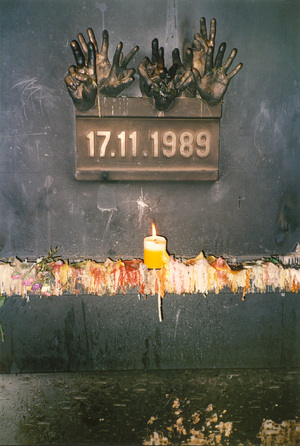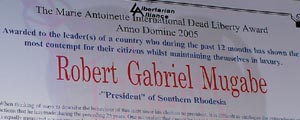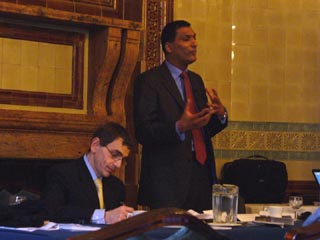We are developing the social individualist meta-context for the future. From the very serious to the extremely frivolous... lets see what is on the mind of the Samizdata people.
Samizdata, derived from Samizdat /n. - a system of clandestine publication of banned literature in the USSR [Russ.,= self-publishing house]
|
A few weeks ago I linked to a speech given by the head of a private schools organisation, in which said individual fretted about the decline in the teaching of certain subjects such as physics and foreign languages. Responses were interesting. One or two commenters thought the system is pretty good. (Yes, seriously). One fellow even claimed to be “genuinely bowled over” by how good it was. More common responses were on the lines that in a free market, if there is a shortage of folk with engineering or linguistic abilities, then sooner or later supply would come through, if not from the UK’s own workforce, then from overseas forms of supply. Up to a point I agree. As a free marketeer, it would be perverse for me to bleat about “shortages” or X and Y and then not realise that one person’s shortage is another person’s entrepreneurial opportunity.
The difficulty, of course, is that we don’t have a fully free market system of education in this country, but one in which the incentive impact of price signals and salary levels gets blunted by a predominantly state-run system, with its national programmes, bureaucracies and state-mandated certificates and qualifications. This means that if there is a shortage of say, physics teachers, it may take a while for the shortage to be made up. Learning physics to a high standard can take even the brightest students quite a while. And if the supply of teachers in certain fields drops off, it can take several years to make up the gap easily, though modern technology possibly can help disseminate information more effectively than the chalk-and-blackboard approach of the past.
If, on the other hand, the scarcity of physics teachers changes slowly, then a more market-driven schooling system can react to that more nimbly. People who work in industry but who may want a less stressful life might be interested in teaching science part-time, for example. Among the greying populations of the industrialised world, there might be a potentially big pool of people who might like to teach the young but on a part-time basis.
A story here points to continued worries about what is happening with science education in this country, especially in the field of physics. I am not of course saying that the existing system can be made better by tweaking a few courses here and there. A move towards a genuine market in education is what is required over the long term.
For those who think of schooling in a post-Prussian statist mindset, you can blow out some collectivist cobwebs here and also here
In response to overwhelming popular demand (Julian Taylor can be a bit overwhelming sometimes) here is the text of the Marie Antoinette International Dead Liberty Award for the year 2005, which has been awarded by the Libertarian Alliance to Robert Gabriel Mugabe, and which I featured yesterday in one of these photographs.
Click on this:
I hope you (Julian Taylor) can read that okay, and that it need not be typed in, again.
So, since we are on the subject of Mugabe, how are things in Zimbabwe these days? Well, this story says quite a lot:
Harare, Zimbabwe, 11/17 – A magistrates court in Zimbabwe Thursday dropped corruption charges against President Robert Mugabe`s nephew, two weeks after his high profile arrest on suspicion of graft involving billions of dollars.
Leo Mugabe and his wife Veronica were arrested on charges of illegally selling flour on the local market and exporting it to Mozambique.
Trade in wheat and flour, both of which are in short supply here, is controlled and exports are banned to preserve stocks for the local market.
No evidence, according to the magistrate. I do not suppose that lack of evidence is usually much of a problem, in Zimbabwe nowadays. But this case must have been rather different.
I wonder how Robert Mugabe himself feels about this. I do not assume that he will automatically side with his nephew. As I wrote here, a while ago, I was briefly acquainted with another relative of his, and I can report that the Mugabe family is not the proverbial big happy one. They do not all stick together. They quarrel. And Robert Mugabe is easily stubborn enough and self-righteously cruel enough to throw a relative to the wolves, if he decided that this was the right thing for him to do, just as he has decided that wrecking Zimbabwe is the right thing for him to do and will stubbornly continue with that, until death or ruin stops him.
In other words, this Libertarian Alliance prize will change nothing in Zimbabwe, nothing at all. But, future recipients of the award may perhaps be influenced by it.
Like Brian Micklethwait, I have been at the annual conference of the Libertarian Alliance , held at the National Liberal Club, a glorious Victorian building erected at a time when Britain’s ruling Liberal Party (formerly the Whigs) was genuinely liberal in the classical sense of that word. Among the topics to fuel the mind: libertarian approaches to the environment, a debate about whether limited-liability companies were a good thing; the contribution to libertarian thought of Ayn Rand and reflections on private enterprise and defence. An excellent collection of subjects.
As some regular readers will know, the founder and director of the L.A., Chris R. Tame, has been fighting cancer and made a great effort to be present throughout the entire conference. Anyone who knows and admires this clever, generous and tenacious man will not be surprised at his determination not only to set up this conference but also to set in train plans for future events. He received a surprise award celebrating his achievements on Saturday night’s banquet, and no-one deserved it more. Without Chris, it is probable that Britain’s present libertarian movement would not exist, and I don’t think I am writing out of turn in doubting whether Samizdata would be quite what it is now, either.
How the Internet did away with UFOs, alien abductions, etc.:
. . . Wild rumors and dubious pieces of evidence are quick to circulate, but quickly debunked. The Internet gives liars and rumor mongers a colossal space in which to bamboozle dolts of every stripe – but it also provides a forum for wise men from all across the world to speak the truth. Over the long run, the truth tends to win. This fact is lost on critics of the blogosphere, who can only see the exaggerated claims and gossip. These critics often fail to notice that, on the ‘net, the truth follows closely behind the lies. . . .
The blogosphere is massively better in quality than the average quality of its parts. You cannot say that telephones are pointless nonsense merely by pointing out that many and perhaps most mere individual telephone conversations are pointless nonsense, and many and perhaps most telephones woefully underexploited. And you cannot derive the crapness of the blogosphere merely from the fact that most blogs, and many blog postings even on good blogs, are crap.
Read the whole thing here. Thanks to Arts & Letters Daily for the link.
I have just spent the day at Liberty 2005, the Libertarian Alliance run conference being held over this weekend at the magnificent National Liberal Club. As well as listening attentively, I snapped photos.
Here is speaker number three today, Syed Kamall MEP, in action:
And here is Gabriel Calzada who will be first up tomorrow morning:
Syed was most impressive, and I am confident Gabriel will be too. No time to elaborate now on what is actually being said at this gathering, but I hope I will manage to later.
These two pictures, and another eighteen, at my place.
Are the political opponents of George Bush, who are advocating cut-and-run in Iraq, about to take the attrition war there (which by any objective measure the USA cannot possibly lose on the battlefield) and turn gradual military advantage into decisive political defeat?
Discuss.
I recall how, a few months back, during all the fuss about Making Poverty History by having a singsong, well dressed and articulate Africans were to be seen on our television screens explaining, throughout the week in question, that, actually, just chucking money at Africa would not really solve the problem. In fact, some of them said, it could well make things worse by making it less necessary for the governments that hoovered up most of the money to earn their money, so to speak, by taxing their own misgoverned and hence impoverished people. (I use the word “earn” in a very relative sort of sense here.)
Last night, the same thing happened again. Kofi Annan had been enthusing about that now quite famous hundred dollar laptop. And once again, well dressed and articulate Africans was summoned to the studios, and they said that, actually, if you are looking for a way to spend a hundred dollars on an African child, you could do a whole lot better than spend in on a laptop computer.
Victor Keegan also waxes enthusiastic about the hundred dollar laptop in the Guardian today, being understandably reluctant to enthuse about the other hot topic at the big UN shindig in Tunis where the hundred dollar laptop was being promoted, which is the UN plan to take over the internet.
But until the UN puts its own house in order by controlling member states imposing censorship on the web, such as China and Tunisia, it won’t have the moral authority – let alone the management skills – to do the job itself.
Quite so, although I do not like that “until”. My attitude to the internet is simple. It ain’t bust. Don’t unfix it by putting the UN in charge of it, ever. However, as it says here (you need to scroll past the woes of Sony):
The battle for control of the Net ended peacefully before the fight even began, but some are still unhappy with the outcome.
Me included. What they mean is that lots of people wanted more done on this front. I wanted less than they have already done, which is that they have set up a completely powerless talking shop to discuss “internet governance”. And if you believe that the plan is for this talking shop to do nothing but talk for ever and be completely powerless for ever, then you will believe anything.
Although the hundred dollar laptop could not possibly be as big a catastrophe as the UN’s planned strangulation of the internet, it could nevertheless waste a lot of money and cause a lot of grief. Imagine not having had any food for two days and being presented with one of these contraptions, as will surely happen to many wretched Africans if this boondoggle goes ahead.
As Tim Worstall explained at the ASI blog over a month ago, a posting that Kofi Annan has clearly not read but should have, that hundred dollar price assumes huge production runs, and also assumes that the various governments who are supposed to pay for these things will also bear the further costs of explaining to people how they work and of mending them when they go wrong. Worse, if these devices are to supply the internet connections that they are supposed to, these governments may have to contrive communicational infrastructure that does not now exist,. As Worstall points out, the kind of people now getting most enthusiastic about this gadget are also the kind of people who are most opposed to the idea of making aid conditional on things like that being done more sensibly.
Even at a hundred dollars, as the well dressed Africans were pointing out last night, these thing are absolutely not a bargain for an African child. Schooling for a year would make more sense. Better food would be nice.
On the face of it, making a kind of global Volkswagen of laptops is appealing. But the more usual method for making cheap stuff is for it to be made expensively first, and checked out by rich organisations and rich people, and then gradually – or, as often happens, not so gradually – cheapened. This is what is happening anyway with computers, and even more spectacularly with mobile phones, which already are hundred dollar portable computers with communication built in, if you think about it. Keegan mentions the success of cheap mobile phones in Africa, but does not seem to have absorbed the lesson of that success, which is that mobile phones are, it turns out, a whole lot easier to use in Africa than laptops. Ah yes, but those mobiles are being used to do business, not being given to the kiddies.
You get the feeling that Kofi Annan is really only trying to make the UN look necessary and useful, instead of a big pointless coagulation of corruption and foolishness which he is now unwilling or unable to clean up. Here, he reckons, is his chance to say that “Business isn’t supplying this, but hey! – we can!”. The truth is that they can probably not do this but that bad old big business maybe soon will and in many ways already is doing it. If it ever does make sense for Africa’s children all to have laptops, this will surely not be until the price of them goes down to something nearer to ten dollars than a hundred. My guess is they will all have mobiles long before then.
Today is the 16th anniversary of the Velvet Revolution or of the day when it all ‘officially’ started on Friday 17th November, 1989 at a demonstration in Prague. (There was one in Bratislava the day before but did not get initially much recognition.)
It was the death of a student, beaten by the Secret Police (or not so secret police), at the Prague demonstration that day that has pushed the students and actors across the country to articulate political demands, go on strike and start protesting in the streets daily. The theories behind this ‘final straw’ are many and varied – some argue the murdered ‘student’ was an agent provocateur who meant to start the ball rolling and enabled the powers-to-be orchestrate a peaceful, if not just, demise of the communist rule in Czechoslovakia. Time will tell the real story, I am here to remember mine.
At the time, 17th of November 1989 did not feel any special – there were some demonstrations before and usually were thinly spread around various anniversaries of dissident occassions. There was no indication that this is to be any different. With a flurry of activity from the dissidents, barely reported by the media and as usual, with more details broadcast by the heavily jammed Voice of America or Radio Free Europe.

I was then a teenager, with a twist – I knew that I had no control over my future and that I faced two choices only. In order to blend in, accept the evil around me in exchange for a semblance of a ‘normal’ life. Or follow in my parents’ footsteps and forsake all that is considered good and rewarding in a healthy society, such as higher education, travel, even family and potentially freedom. I may have been very young but, alas, not young enough to be blind to the full horrors of such life. After all I had seen those around me living with similar decisions. As it happens, that choice was not real – having been part of the dissident movement, I was weighted, marked and tagged as the enemy of the state. I belonged to the dark forces undermining the society – a phrase so beloved of the communist media.
I remember the nervous elation of the ‘now or never’ moment, as we walked to the main square to meet thousands of others who felt the same. It was a powerful sensation to be surrounded by hundreds of thousands of people knowing that they are there for the same reason – an experience unprecedented in a fractured and diseased society under communism.
It was not until Monday, 27th of November, when the two-hour general strike took place, that we were sure that tanks will not be rolled out to face us. This was not without reason as on November 23rd the army declared its readiness. To do exactly what, we dared not speculate. At demonstrations between the two dates the list of those supporting the General strike was read out. There was a sense of profound relief when workers from a factory appeared on that list. We knew then that the communists had lost the propaganda war and a loud cheer reverberated across the square.
But the fight was not truly over until December 10th, when the first federal government since 1948 was appointed that did not have the Communist majority. We went to the streets once more, most of us looking for and looking forward to the sensation of true solidarity that had already started to fade. And the rest is history…
I find that my memories lack the nostalgia compulsory for any survivor of such social and political upheavals. My life has certainly changed beyond recognition as a result of the 1989 events, nevertheless I find it very hard to get dewy-eyed about my ‘revolutionary credentials’. I do treasure the experience of seeing thousands upon thousands of individuals come together in a collective action that has changed the world around them. That was genuine no matter whether it was sparked off by manipulation or whether what followed in the aftermath was far less heroic.
Scientists eh? First they tell you all the things you have to do to stay in perfect health and be immortal. Then they tell you that that very things they have been recommending for the last three decades are what will kill you.
The latest health fad to get the treatment? Decaf coffee:
The US study looked at 187 people, a third of whom drank three to six cups of caffeinated coffee a day, while a second group drank the same amount of decaffeinated coffee, and the rest had no coffee.
Researchers measured the level of caffeine in people’s blood, as well as a number of heart-health indicators, including blood pressure, heart rate and cholesterol levels over the course of the three month study.
At the end of the study, the group drinking decaffeinated coffee had experienced an 18% rise in their fatty acids in the blood, which can drive the production of bad ‘LDL’ cholesterol.
Bad cholesterol. Bad!
There has only ever been one good reason to drink decaffeinated coffee, which is that you like it.
My nutritional recommendation just now is: Walkers Marmite Flavoured Potato Crisps. Mmmmm. (I get mine from the new Sainsbury’s in Wilton Road, Victoria.) As it says on the packets:
Same great taste . . . now better for you.
We have been reducing the levels of saturated fat in our crisps so that now they contain 30% less saturated fat than in 2003.
This is because we carefully blend our vegetable oil with a special sunflower oil to produce a better crisp with all the same great taste.
Indeed.
In related news, I note with alarm that Alex Singleton appears to have eaten nothing since November 6th. Has he died of starvation? Perhaps. But Singleton Diet commenter Paul Coulam expresses a different fear:
Do the lack of blog entries indicate that you have fallen off the wagon and are lying in your bed, curtains closed, with crisp bags and pizza boxes scattered all over the floor and chocolate smeared all round your mouth?
So is it famine, or feast, or something else again, such as a moderate diet of marmite flavoured crisps, washed down with not too many cups per day of decaffeinated coffee?
Those strange-sounding financial entities known as hedge funds, which are sometimes depicted as the Darth Vaders of the modern market, often have rather odd or dull names. So I was glad to come across a firm in the United States with a name that proudly celebrates the free market with unabashed gusto.
The firm has a great merchandise selection, too.
I am certain it comes as little surprise to any of our readers that politicians are, by nature, liars. Still, it is a bit of fun to see them blatently caught at it, especially when the lying is potentially putting the lives of their own citizenry at risk.
This Republican film clip shows the moving lips and indeed proves our belief in a multi-party system being the best thing next to a no-party individualist system. Competition makes the antagonists apply resources to counter 1984 style rewrites of history,
Of all the Democrats shown, only the Clintons are truthful enough to admit and some extent hold to their past sentiments. They represent the most honest and upstanding individuals the Democratic leadership has to offer.
Take that as you may…
“If the French social model is so great, why is the country in flames?”
– Peter Mendelson in an off the cuff remark before talks with Philippe Douste-Blazy, French foreign minister.
|
Who Are We? The Samizdata people are a bunch of sinister and heavily armed globalist illuminati who seek to infect the entire world with the values of personal liberty and several property. Amongst our many crimes is a sense of humour and the intermittent use of British spelling.
We are also a varied group made up of social individualists, classical liberals, whigs, libertarians, extropians, futurists, ‘Porcupines’, Karl Popper fetishists, recovering neo-conservatives, crazed Ayn Rand worshipers, over-caffeinated Virginia Postrel devotees, witty Frédéric Bastiat wannabes, cypherpunks, minarchists, kritarchists and wild-eyed anarcho-capitalists from Britain, North America, Australia and Europe.
|







